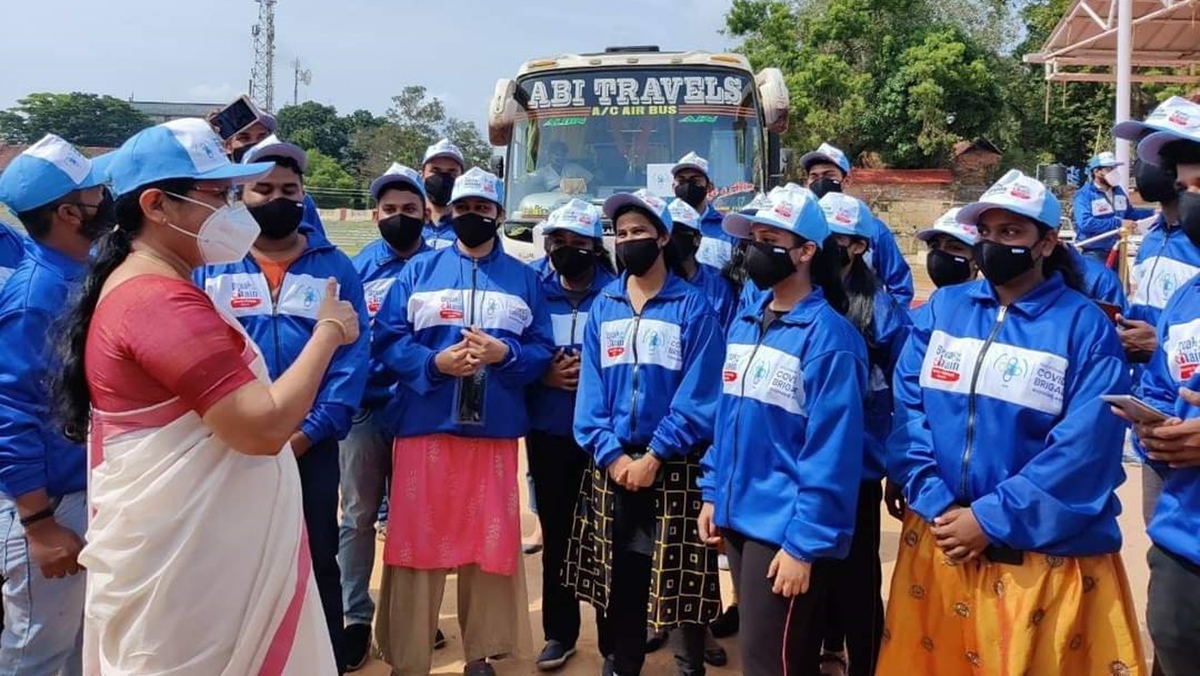 Last week, a team of 26 comprising doctors, nurses, pharmacists and lab technicians after extensive training set off from Thiruvananthapuram for Kasaragod.
Last week, a team of 26 comprising doctors, nurses, pharmacists and lab technicians after extensive training set off from Thiruvananthapuram for Kasaragod. As Kerala prepares to see an exponential spike in the number of Covid-19 infections in September and October, possibly even in the range of 10,000-20,000 daily cases as predicted by health minister KK Shailaja, it has begun to build up the human resources, both medical and non-medical, to meet the demand at hospitals and first-line treatment centres (FLTCs).
Young professionals with backgrounds in medicine, nursing, pharmacy, business administration, data-entry and social work are being recruited on a first-come-first-serve basis by the state, trained by experts and then deputed to Covid hospitals and FLTCs in rural areas of districts suffering from an acute lack of manpower. The call to form a ‘Covid Brigade’ made up entirely of young professionals was first given by Chief Minister Pinarayi Vijayan in late July with a portal inviting applications.
Last week, a team of 26 comprising doctors, nurses, pharmacists and lab technicians after extensive training set off from Thiruvananthapuram for Kasaragod, a rural district bordering Karnataka in the state’s north where health infrastructure has historically been weak. They have been handed charge of running two FLTCs round-the-clock where asymptomatic and those with mild Covid-19 symptoms are treated. A second batch of 10, to be deputed to a hospital ICU in Pathanamthitta, is already under training. In the next few weeks, more batches are scheduled to undergo training in a decentralised manner across the state’s 14 districts. Salaries are paid to them by the National Health Mission (NHM) with district programme managers overseeing their activities.
“They are primarily trained in infection control, basic life support, advanced life support and imparting motivation. They have been briefed on medical and referral protocols to be followed at the FLTCs. For eg, who is to be admitted and discharged etc. Before deployment, they are sent to local FLTCs to get field experience before they encounter the real situation,” said Dr S S Santhosh Kumar, who led the training programme.
Kumar is the deputy superintendent at the Thiruvananthapuram Medical College who led a team of specialised doctors and nurses to Mumbai in early June at the request of the Maharashtra government to fill gaps in the health infrastructure in that state.
Dr Ashley Franklin, 28, a fresh MBBS graduate from a college in Russia, is among the first batch of the Covid Brigade posted at an FLTC set up inside the men’s and women’s hostels at the Agricultural University in Kasaragod. A mother to a two-year-old, this is the first time Dr Franklin is staying apart from her daughter.
“It’s very difficult. I’ve even felt like leaving everything and going back to her, but in this situation, I cannot do that,” she said, over the phone.
“It has not been like what we expected. It has been far more overwhelming when we started working in the PPE kits. Honestly, we hadn’t thought it would be so difficult to work wearing the kits. When we remove the kits, all of us are drenched in sweat,” she said.
But the upside, she said, is to see everyone working in tandem in a situation like this, right from students who volunteer for cleaning duties to local body officials arranging food and medical supplies without delay.
“To see them giving their all and working earnestly makes us feel we are doing something great,” she said.
Due to paucity of personnel at FLTCs like this, doctors like her have to multi-task often, from making the rounds of patients, offering psychological support to doing data-entry work. “There is an urgent need for more human resources.”
At present, Kerala’s mortality rate is 0.39 per cent, among the lowest in the country. It has been managed by a combination of factors such as early detection of cases, releasing the pressure on hospital ICUs through creation of FLTCs at grassroots level and carrying out extensive acute respiratory illness (ARI) surveys within clusters to weed out those at high risk of getting infected with Covid-19.
But if cases surge, to the range of 10,000 daily infections in mid-September, Kumar is vexed to imagine the scenario that might emerge in hospital ICUs, both in terms of paucity of beds and personnel.
“Our concern shouldn’t be how many people are afflicted, rather how many people are seriously ill and how many are dying. Otherwise, 85 per cent of the afflicted go unscathed. Since the positivity rate varies with the number of tests being conducted, we cannot obtain a clear picture of the situation. What we need to look at is the relation between the number of people in the ICU and the rate of death. That statistic cannot be manipulated and is, therefore, a more reliable index to forecast the situation,” said Kumar.
Unlike Mumbai, where people live in far-more compact spaces, Kerala has managed to implement reverse quarantine effectively among the elderly and the under-10 segment to keep them away from the path of infection, he said. “Our socio-economic conditions are better and families can afford to keep them apart, feed them separately and maintain social distancing,” he said.
(Reporting contributed by Deborah Thambi, an intern with indianexpress.com)